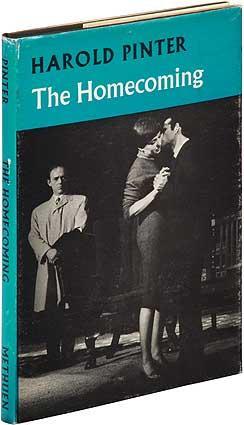
The Homecoming
The Homecoming is a two-act play written in 1964 and published in 1965 by Harold Pinter. Its premières in London (1965) and New York (1967) were both directed by Sir Peter Hall. The original Broadway production won the 1967 Tony Award for Best Play. Its 40th-anniversary Broadway production at the Cort Theatre was nominated for a 2008 Tony Award for "Best Revival of a Play".
For other uses, see The Homecoming (disambiguation).The Homecoming
Max
Lenny
Sam
Joey
Teddy
Ruth
3 June 1965
Aldwych Theatre, London
English
Family
Drama
Summer. An old house in North London.
Set in North London, the play has six characters. Five of these are men of the same family: Max, a retired butcher; his brother Sam, a chauffeur; and Max's three sons: Teddy, a philosophy professor in the United States; Lenny, a pimp who only makes discreet references to his "occupation" and his clientele and flats in the city (London); and Joey, a brute training to become a professional boxer and who works in demolition. The sixth character is a woman, Ruth, Teddy's wife. The play concerns Teddy's and Ruth's "homecoming," which has distinctly different symbolic and thematic implications. In the initial productions (as well as a 1973 film adaptation), Pinter's first wife, Vivien Merchant, played Ruth.
Setting[edit]
The setting is an old house in North London during the summer. All of the scenes take place in the same large room, filled with various pieces of furniture. The shape of a square arch, no longer present, is visible. Beyond the room are a hallway and staircase to the upper floor and the front door.
Symbolism and irony of title[edit]
In addition to the play being about Teddy's homecoming on a literal level, critics have suggested that, on a metaphoric level, the homecoming is Ruth's. That, symbolically, Ruth comes "home" to "herself": she rediscovers her previous identity prior to her marriage to Teddy.[4]
Ironically, as she "comes home" to this family which has been for so long woman-less (motherless, wifeless, etc.), she thus abandons her own biological family with Teddy, leaving them now similarly bereft.[6]
By the end of the play, Ruth appears to have assumed the multiple roles of Jessie, the family's absent wife and mother, the missing woman in their household ("mother/wife/whore" in terms used by critics), while putting the American family of Ruth and Teddy in a parallel position, thus ironically reversing the situation at the beginning of the play.[6] In that sense, the play recalls Edward's reversal of roles with the silent Matchseller in Pinter's 1959 play A Slight Ache, initially broadcast on BBC Radio 3, and similarly ironic plot and character role-reversals resulting from power struggles throughout many of Pinter's other plays.[7]
For many critics the missing "back wall" in the "large room" of the house described by Pinter as "removed" (p. 21) and by Teddy as "knocked [...] down to make an open living area" after Jessie's death (p. 37) symbolises the absent female influence.[8][9][10][11]
In October 2007, as quoted by Lahr, Pinter said that he considers The Homecoming his most "muscular" play.[12]
After Teddy comes home and introduces his London family to his wife, Ruth (pp. 35–40), Max invites her to remain with them in London; as Teddy puts it to her euphemistically: "Ruth ... the family have invited you to stay, for a little while longer. As a ... as a kind of guest" (p. 91). Whereas Teddy
must return home to his life and family in America (pp. 91–96) to fulfill his
obligations, Ruth agrees to "come home" (p. 92), by refusing to honor any longer her now defunct obligations as wife and mother, to more than willingly take up her part in the family business (so to speak) as well as succeeding the late Jessie (Max's wife and his sons' mother), filling the gap created by and since the other woman's death (pp. 92–94).
On first seeing Ruth, Max believes that his eldest son, Teddy, has brought a "filthy scrubber" into "my house", adding, "I've never had a whore under this roof before. Ever since your mother died" (pp 57–58). A major irony is that Max's apparently-mistaken first assumption becomes more accurate as the family (and the audience) get to "know" Ruth better (pp. 65–76). The play makes clear to Teddy's family, even if Teddy refuses to acknowledge it, that Ruth has been, to say the least, increasingly unhappy in married life and in the United States.
When her husband insists she is "not well" (p. 85) and simply needs to "rest" (p. 71), Teddy is clearly both downplaying and ignoring the cause and extent of her discontent, even depression, draping his words in almost Victorian modesty. However, he ultimately elects to leave without her rather than fight for her. It has not been Teddy's "homecoming" but that of Ruth.